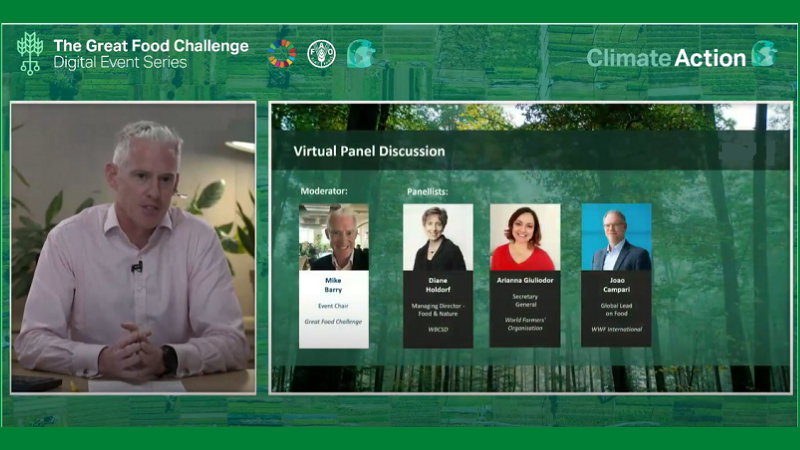On September 3rd, the Secretary General of the World Farmers’ Organisation, Arianna Giuliodori, brought the voice of the farmers of the world into the virtual debate “Food Security and the Global Recovery”, the first of a three-part digital event series hosted by the Food and Agriculture Organisation of the United Nations (FAO) and Climate Action under the title “the Great Food Challenge”.
The virtual meeting, joined by 1,500 attendees, featured the participation of Dr David Nabarro, Special Advisor to WHO, United Nations; Maria Helena Semedo, Deputy Director General, Food and Agriculture Organization of the United Nations; Diane Holdorf, Managing Director, Food & Nature, WBCSD; Joao Campari, Global Lead on Food, WWF International.
Here are some key messages from the WFO Secretary General’s speech:
- The biggest challenge of the food systems today is our ability to overcome the silos approach that we have been experiencing so far. Being brave enough to dare new kind of partnerships and a new type of collaborations is crucial to ensure that we can have healthy people living on a healthy planet, with a lively agricultural sector. Farmers are at the centre of each one of the many challenges we have to face. Food security, climate change, nutrition, equality, and biodiversity see farmers at the very heart, and farmers can be a huge part of the solutions and they are ready to do their part.
- The paradox of food producers getting hungry and poor hits very hard on the farmer’s community. Excessive concentration is a threat in value chains. It is necessary to ensure that farmers participate in the creation of value and that there’s a fair share of value across the chain, but to do that we need companies that are bright-minded and able to understand this. Still, farmers are also consumers and if we do not take them out of poverty, there will be no chance to sell products.
- Soil health is the most precious thing for any farmer, being it an arable crop farmer, a forestry farmer or even a livestock farmer. Farmers are the first that are interested in promoting soil health but what we need here are tools, education skills and also innovation to ensure that we can work together across the value chain to ensure that farmers can invest in soil health.
- We must build bridges between farmers and consumers to enhance the awareness about what it means to produce food and what a healthy and nutritious food look like which might be slightly different from what the consumers are sometimes expecting.
We should act on two different levels. On the one hand, we need to invest in local food production shortening the chain so that food can have a shorter trip from farm to fork and therefore being also more accessible.
On the other hand, we need to work on the longer value chains to make them more transparent and fairer and make sure that those value chains are integrating the real costs of productions. Most of the times, the farmer is bearing the cost of adapting to standards, maybe higher standards, but does not see a return on the price of the product.- In many regions, COVID found farmers in the middle of the production season so they kept harvesting even if it was very difficult to take the product to the market. Still, farmers had also taken loans or financial commitments to plant, so now governments must take immediate action to ensure that farmers can bridge the season and plant for the next one.
